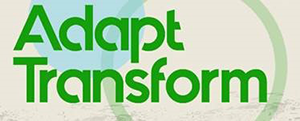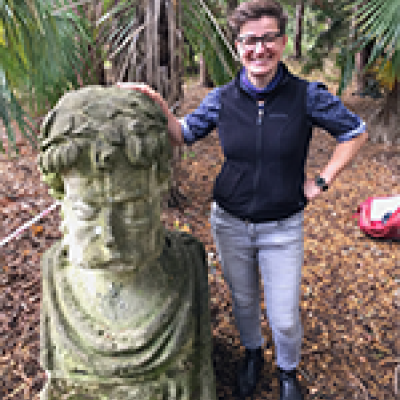Dr Katrin Wilhelm
Researcher and Departmental Lecturer
Tutor at Regent's Park College, Oxford
Member and co-lead of the OxRBL
Member of the Equality, Diversity and Inclusion Committee
Member of the Fixed Term Researcher Forum
Researcher and Departmental Lecturer
Tutor at Regent's Park College, Oxford
Member and co-lead of the OxRBL
Member of the Equality, Diversity and Inclusion Committee
Member of the Fixed Term Researcher Forum
Academic Profile
Katrin Wilhelm, is an interdisciplinary, senior researcher, uniquely blending her background as a first-generation academic, former stonemason, and DPhil graduate from the Oxford Resilient Buildings and Landscapes Lab (OxRBL) — which she co-leads with Prof Viles.
Katrin holds dual appointments as a Senior Researcher in the NIHR Biomedical Research Centre Flourishing and Wellbeing Theme, Department of Psychiatry and in the School of Geography and the Environment (research and DL).
Katrin's interdisciplinary research spans geography, heritage science, and preventive mental health, utilising 'living laboratories' such as built heritage, green spaces, and museums to develop innovative solutions for building, environmental, and mental health. She leads both rigorous research and participatory community engagement initiatives to advance public health, heritage science, and sustainable infrastructure. Her projects investigate how historic and modern environments enhance climate resilience, culture-led adaptation, and mental well-being through nature-based and socio-ecological approaches. This comprehensive strategy integrates physical, digital, social, and environmental health to promote sustainable, resilient futures.
She obtained her diploma in Restoration, Art Technology and Heritage Science from the Technical University Munich (TUM) and her DPhil from the University of Oxford. Before her academic career, she worked as a trained stonemason and as a site manager for heritage site conservation. Her DPhil thesis focused on improving non-destructive techniques for stone weathering research in situ.
Katrin is currently engaged in supervising undergraduate and graduate research in physical, environmental and heritage geographies, as well as delivering undergraduate teaching. She also has a passion for outreach and engagement and has led several highly successful public-facing projects. She sits on the university Heritage Network steering committee under the Climate Heritage Network and is a member of the (En)Coding Heritage Network.
In recent years, Katrin has carried out field-based research in many places in the UK and Germany, as well as in Italy, Turkey, and Jordan.
Integrating Heritage Science and Preventive Mental Health for Sustainable and Resilient Futures
My research explores how historic and modern environments impact society, well-being, and building health. Through three interrelated themes, I study heritage and built environments as living laboratories for resilience, sustainability, and public health. This interdisciplinary approach leverages heritage sites and modern infrastructures to promote sustainable, resilient futures and enhance public health.
1. Exploring the 'Urban Environment and Well-being' Nexus:
I examine how the health of historic and modern buildings impacts human well-being, focusing on adaptive reuse (& release), nature-based solutions, and environmental health. Projects like OPAQ utilise heritage as geochemical archives to monitor urban pollution, linking air quality, material longevity, and green infrastructure to urban health outcomes. This theme promotes healthier urban environments and informs policy.
Projects: AGILE, Flourishing & Wellbeing, OPAQ
2. Building Resilience Against Environmental Stress:
This theme explores how materials in heritage settings respond to environmental pressures, informing sustainable conservation strategies. Through projects such as the Built Heritage Research Initiative (BHRI), Water Cycle For Resilient Heritage (REFRESH), and Lab-In-Your-Pocket (LIYP), I develop sustainable conservation methods and economical preservation tools. This repositions heritage from a 'victim' of climate change to a catalyst for transformative adaptation, highlighting its role in driving resilience and sustainability.
3. Transforming Historic Spaces into Living Labs:
This theme re-conceptualises historic environments as living labs to inform sustainable infrastructure design and management; for example, leveraging ancient practices like Petra's water systems for low-carbon, climate-resilient solutions. As co-lead of SXNCH, I connect researchers, communities, and decision-makers to explore the intersections of cultural and natural heritage. Through ACCE, I facilitate knowledge exchange for the next generation at sites like Petra and Pompeii, and with Urban Bio-Labs, I investigate plant-heritage interactions to enhance public engagement and promote sustainable urban futures.
Projects: SXNCH, ACCE, UrbanBiolabs
Current Research
REFRESH: WateR Cycle For Resilient Heritage
Cultural heritage, including museum collections and built environments, is a vital socio-cultural and economic resource. However, the impact of climate change on heritage, particularly through heritage hydrology, remains underexplored. As the UK PI on the REFRESH project, led by Julie Desarnaud (KIK-IRPA), a three-year international and interdisciplinary initiative supported by the Belmont Forum/JPIs in Cultural Heritage and Climate Change, Katrin collaborates with partners in Belgium, France, and Italy to investigate the role of water in heritage conservation. The project focuses on water dynamics at three scales: liquid water in natural environments (soil and vegetation), liquid-to-vapor transfer within building envelopes, and vapor-to-liquid processes in interiors and collections. By optimising water management and integrating passive solutions and innovative materials, REFRESH aims to enhance heritage resilience to climate change and promote sustainable development across case study sites in the UK, France, Italy, and Belgium.
The AGILE initiative: Is "Nature" a Policy Solution to Mental Health in Schools?
Schools are facing a mental health crisis, prompting some to explore Nature-based Programmes for improving student well-being, though evidence of their effectiveness is limited. As co-lead, Katrin works with a multidisciplinary team from Oxford to assess the impact of these programmes on young people's mental health. In collaboration with the UK Department for Education, we evaluate these initiatives using Deliberative Policy Analysis to inform policy recommendations. This project aligns with national sustainability strategies and aims to contribute to evidence-based educational policies while addressing the growing mental health crisis among UK youth.
BHRI - P2 (Built Heritage Research Initiative - Phase 2): Sandstone Conservation
Conflict and environmental change present growing threats to heritage worldwide. Katrin’s work, in collaboration with the Oxford Resilient Buildings and Landscapes Lab (OxRBL) and the Getty Conservation Institute, addresses these challenges by developing a multi-method approach for evaluating conservation treatments for sandstone. Through the Built Heritage Research Initiative, this collaboration brings together scientists and conservators, integrating lab and field science to better understand how built heritage materials deteriorate and improve the links between conservation science and practice.
OPAQ - Oxford's stone-built heritage as a proxy for historical air quality
Katrin leads a transdisciplinary, collaborative project with Dr Jack Longman (University of Northumbria), Dr Chris Standish (University of Southampton), Neil Young and Phani Karamched (David Cockayne Centre, Department of Materials, University of Oxford), Michelle Jackson and Dania Albini (Zoology, University of Oxford), Josep Grau-Bove and Miriam Wright (Institute for Sustainable Heritage, UCL) and Tim de Kock (University of Antwerp) funded by a SoGE Inspiration Fund and the John Fell Fund. This study advances air pollution research by telling the time on the 'pollution clock' preserved in black crusts and thus, established urban stone-built heritage as an economical long-term geochemical archive for past and presents air pollution including microplastics.
Lab-In-Your-Pocket - Utilising Smartphones for Heritage Teaching and Citizen Science & Science Communication
Katrin leads the Lab-In-Your-Pocket an ongoing research project based at Oxford's School of Geography and the Environment which is further supported by the Oxford Resilient Buildings and Landscapes Lab (OxRBL) and collaborates with Kathryn Eccles at the Oxford Internet Institute and Heritage Pathways team. It is divided into two strands; one which addresses the untapped potential for formalising research methods around mobile technologies in Higher Education, and another which looks towards developing citizen science tools for diversifying public heritage spaces through digital engagements.
'SXNCH' - "Synchronising Knowledge, Diversifying Participation and Building Resilience for Sites at the Intersection of Natural and Cultural Heritage"
Katrin co-leads SXNCH, a globally engaged research group and growing network, based at the University of Oxford, focused on understanding the intersection of cultural and natural heritage. The aim is to better understand sites at the intersection of cultural and natural heritage by bringing together researchers, experts, local leaders, communities, decision makers, worldwide, promoting shared learning and collaborative problem-solving.
SXNCH aims to enhance historic environment management and foster sustainable opportunities for communities and heritage to thrive together.
ACCE: Academy of Conservation and Care for the Environment (ACCE) 2024
To safeguard the UNESCO World Heritage site of Petra amidst rapid societal and climatic changes, ACCE 2024 fosters national and international knowledge exchange among postgraduate students and young professionals. This initiative creates a platform for emerging professionals to engage in workshops that bridge natural and cultural heritage, collaborating with local communities. Rooted in cross-cultural and transdisciplinary principles, ACCE promotes the exchange of ideas and methodologies, building networks for future collaborations. The inaugural ACCE 2024 in Petra serves as a living lab, addressing integrated environmental management challenges and developing sustainable conservation practices for resilient futures.
Petra (Jordan): Concept Development for an Education and Training Programme in the Field of Cultural Heritage
Katrin is co-lead in a collaborative project with the Fraunhofer Centre for International Management and Knowledge Economy, the Fraunhofer Institute for Building Physics, and Dr Martin Michette (OxRBL) funded by the German Foreign Office. The main aim of the project is to develop a concept for an Education and Training Programme in the Field of Cultural Heritage in Petra, Jordan (in response to Covid-19 focussing on digital literacy and virtual networking at the moment).
Urban BioLabs - Engaging Publics with Urban Heritage through Plants
The Urban Bio-Labs project brings together an interdisciplinary team of researchers from the Open University and the University of Oxford with non-academic partners from the heritage (Oxford Preservation Trust) and art-science sectors (Artecology) to explore how plants can be a vehicle for renewing public engagement with urban heritage and its futures. Building on our academic research base, the project aims to strengthen on-going collaborative relationships with the partners through knowledge exchange and develop impactful engagement activities under the theme of built heritage-plant interactions.
Project archive
Arch & Lab Pompeii - Restoration Archive and Exposition Laboratory
Katrin managed, coordinated, and conducted research on an interdisciplinary project with the Max-Planck Institute for Art History in Florence and the Fraunhofer Institute for Building Physics in Munich, integrating technical science, art history, and perception to preserve Pompeii's tangible and intangible heritage and advance sustainable material science and its understanding as a transnational European history and culture.
Head Hunting: 350 years History and Mysteries of Oxford's Stone Heads
Karin led an interdisciplinary project investigating the 13 carved busts around Oxford's Sheldonian Theatre and History of Science Museum, uncovering their 350-year history of architectural decay, conservation, and environmental change, which has inspired the Tomorrow's Oxford Heads and OPAQ projects and informs sustainable heritage management and collective identity.
#FindTheHeads
Tomorrow's Oxford Heads (TOH)
Katrin co-led the TOH project with the History of Science Museum, supported by Oxford's Diversity Fund. Collaborating with the History and Mysteries of Oxford's Stone Heads project, TOH aimed to diversify public sculpture at the University of Oxford by enhancing the visibility of women and underrepresented groups. Building on the successful Diversifying Portraiture project, TOH's temporary artworks received overwhelmingly positive responses, demonstrating how artistic interventions can enrich public spaces and foster discussions on diversifying the university's external image.
Syrian Stonemasonry Training Scheme project
Katrin has been involved as an advisor in the collaborative project between the British Council, the World Monument Fund and the Petra National Trust. The project trained female and male Jordanian locals and Syrian refugees in traditional stonemasonry skills to equip them with the ability to work on conflict-affected built heritage.
Funding and awards
- 2024 NERC: AGILE Initiative - Is “Nature” a Policy Solution to Mental Health in Schools?
- 2024 AHRC - JPI/Belmont Forum: REFRESH - WateR Cycle For Resilient Heritage
- 2023 AfOx Catalyst Grants: Limpopo Heritage Lab
- 2023 Teaching Development and Enhancement Project Award (TDEP): Digital tools for Heritage Students: Using the ‘Lab-in-Your-Pocket’ toolkit to support an innovative Heritage training programme and improve Digital Literacies
- 2022 ESRC IAA (stage 2) Kickstarting SXNCH-2: Co-producing a platform and an agenda for Sites at the Intersection of Natural and Cultural Heritage
- 2022 Teaching Development and Enhancement Project Award to develop the Lab-In-Your-Pocket to unlock the untapped potential for formalising research methods around mobile technologies (incl. smartphones) in Higher Education and developing Citizen Science tools
- 2021 2022 MPLS AWS: Human Machine Collaboration Initiative-EdTech-4 test bed: Lab-In-Your-Pocket
- 2021 ESRC IAA (stage 3) Urban BioLabs to develop methodologies for engaging (underrepresented) publics with (neglected) urban heritage through (spontaneous) plants
- 2021 KE Seed Fund to explore how Oxford University researchers can help Winchester Cathedral conserve and engage visitors with medieval tiles and 17th century globes
- 2021 German Foreign Office award for phase 2 of the Petra project to realise the Concept Development for an Education and Training Programme in the Field of Cultural Heritage in Petra, Jordan
- 2021 Social Sciences Engagement Fellowship (HEIF funded). Board member to develop an agenda for sustainable heritage conservation together with the English Heritage Trust
- 2020 University of Oxford Fell Fund in collaboration with Dr Jack Longman (University of Northumbria) and Dr Tim de Kock (University of Antwerp) for "Telling the time on the 'pollution clock' preserved in black crusts: Urban stone-built heritage as an economical long-term geochemical archive".
- 2020 German Foreign Office award in collaboration with the Fraunhofer Centre for International Management and Knowledge Economy, the Fraunhofer Institute for Building Physics, and Dr Martin Michette for Concept Development for an Education and Training Programme in the Field of Cultural Heritage in Petra, Jordan
- 2019 SoGE Inspiration Award in collaboration with Dr Jack Longman and Dr Scott Allan Orr for Oxford's stone-built heritage as a proxy for historical air quality
- 2018 Oxford University Diversity Fund award for Tomorrow's Oxford Heads project in collaboration with the History of Science Museum Oxford
- 2017 SoGE Inspiration Award in collaboration with Dr Martin Coombes for The History and Mysteries of Oxford's Stone Heads project
- 2013 EPSRC (Engineering and Physical Sciences Research Council) studentship grant
- 2013 DAAD doctoral research grant
- 2012-2015 Proceq® research grant
Teaching and Supervision
Dr Wilhelm contributes to the Heritage Science option and Geographical Techniques (Methods in Physical Geography) course and respective field trips. Further, she supervised work experience students, a Nuffield funded student, BA and MA theses and PhD theses. She takes part in admission interviews and organised the UNIQ summerschool field day. She is also part of the team to implement changes for the integrated methods course.
Outreach

The Lab-In-Your-Pocket has teamed up with the Polar Academy to infuse their student field trip with mobile science.

The Tomorrow's Oxford Heads - Diversifying Public Sculpture project and the Lab-In-Your-Pocket will feature in the Adapt-Transform exhibition at the Modern Art Oxford and Brookes University.

With a team she established the SEED (Speedy Expertise Exchange & Discussion) talks in 2015 which showcases the breadth of research going on in the School of Geography and the Environment.





